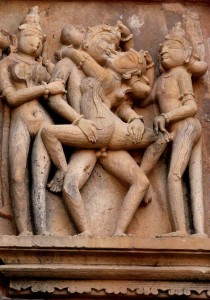Q: While I’m drawn to the apparent peace that sages such as Ramana Maharshi seemed to enjoy, I feel I’m failing to grasp something.
Advaita seems, sometimes, to be totally nihilistic and bleak (although I accept that this would not constitute an argument against its veracity).
It’s all very well to say that the ‘self’ can’t die but this seems (from my perhaps benighted viewpoint) to be playing with semantics.
If, with ‘my’ death, comes only oblivion such as in deepest sleep /anaesthesia, where is the comfort or meaning in this knowledge? The end of my small ‘I’ would seem to be, in effect, the end of everything since, without my consciousness to perceive it, how can anything be said to exist?
Does one take comfort from the fact that other apparent ‘I’s continue to experience within the one reality? It may be that my existence is only apparent and that, whether it is followed by oblivion is irrelevant – but it doesn’t feel like that from where I’m sitting! Continue reading






